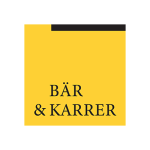In Switzerland, the end of 2018 and beginning of 2019 saw a number of legal developments regarding fintech (in particular the introduction of a new regulatory licence type for financial innovators) and the use of distributed ledger technology (DLT) in financial services. The latest step taken by the Swiss federal government towards strengthening Switzerland's position as a leading DLT hub is a legislative proposal covering various areas of law and regulation with the goal to facilitating the use of DLT by businesses and enhancing legal certainty while limiting the risks of the technology being abused for fraudulent or other undesirable purposes.
On March 22 2019, the Swiss Federal Council presented a preliminary draft of a new law for public consultation, the so-called Federal Act on the Amendment of Federal Laws in light of the Developments regarding DLT (Bundesgesetz zur Anpassung des Bundesrechts an Entwicklungen der Technik verteilter elektronischer Register – Pre-Draft DLT Act), along with an explanatory report. The public consultation period will last until the end of June 2019, following which a revised draft will be prepared for further deliberation in the Swiss Federal Parliament.
The Pre-Draft DLT Act aims to address certain gaps and shortcomings of Swiss law identified in a report of the Federal Council on DLT from December 2018. The key elements of the Pre-Draft DLT Act are the following:
Introduction of DLT-based uncertificated securities: The Pre-Draft DLT Act proposes to amend Swiss civil securities legislation in the Swiss Code of Obligations (CO) to introduce a new category of uncertificated securities: DLT securities (DLT-Wertrechte). The proposed new regime is largely analogous to the regime for certificated securities (Wertpapiere) and aims to facilitate the issuance and use of digital tokens with similar characteristics as traditional instruments. The proposed new provisions of the CO will provide a robust legal framework to enable the transfer of rights and evidence the legitimacy of the holder of a right using DLT.
The recognition of securities registers based on DLT would mark a fundamental change in Swiss civil securities legislation and would greatly enhance legal certainty with respect to (a) the effective "tokenisation" of instruments such as shares, bonds or warehouse receipts; and (b) effecting a valid transfer of such tokenised instruments from one party to another by way of a transaction in a distributed ledger. So far, the legal requirement for a written instrument to transfer uncertificated securities has forced legal practitioners in this area to rely on theories and workarounds that have remained untested in a court of law. The new rules would further enhance the legitimation function of tokenised rights, allowing for the debtor to rely on performance towards the person identified in a distributed ledger entry constituting effective discharge.
|
|
The recognition of securities registers based on DLT would mark a fundamental change in Swiss civil securities legislation |
|
|
To create DLT securities pursuant to the new provisions of the CO, there must be an agreement among the parties as to: (a) the registration of the relevant rights or claims in a distributed ledger (referred to in the Pre-Draft DLT Act as "register"); and (b) the concept that such rights and claims can only be asserted or transferred via such register. The register must have certain properties to enable the valid creation of DLT securities. Inter alia, it must provide for state-of-the-art functional safety and data integrity. Furthermore, the content, operating principles and governing agreement of the register must be recorded in the register itself or in accompanying data, enabling access by users to the data concerning them at any time. Further requirements might be specified in an ordinance to be enacted by the Federal Council once the Pre-Draft DLT Act is finalised and passed into law.
The Pre-Draft DLT Act includes further accompanying provisions on DLT Securities, for example a process for cancellation and rules on the creation of security interests over DLT securities. A potentially controversial concept in the Pre-Draft DLT Act is the proposed introduction of a statutory liability of the issuer/debtor vis-à-vis each purchaser of a DLT security if the former fails to ensure that the register complies with legal requirements, in which case transactions on the register would be null and void. It will be interesting to follow the reactions on this liability concept by interested parties in the consultation process.
Creation of a new licence category for DLT based trading facilities: In its December 2018 DLT report, the Federal Council recognised that DLT creates certain opportunities with regard to financial market infrastructures that are not addressed in current legislation, for example the possibility of serving individuals as clients directly (instead of through the intermediation of regulated entities) or the potential for convergence of trading and post-trading functionalities within one provider.
To address these shortcomings, the Pre-Draft DLT Act provides for a new stand-alone licence type for "DLT trading facilities" by an amendment to the Swiss Financial Market Infrastructure Act (FMIA). DLT trading facilities are described as institutions carrying out the multilateral trading of standardised DLT securities (ie, Swiss law DLT securities that are standardised and suitable for mass trading or comparable foreign instruments), enabling the simultaneous exchange of bids between several participants and the conclusion of contracts based on non-discretionary rules.
DLT trading facilities will require a licence from the Swiss Financial Market Supervisory Authority (FINMA). The key difference to other financial market infrastructure licences is that the DLT trading facility licence will be a unified licence that also allows for the provision of certain post-trading services, such as central custody/depository services, clearing and settlement. The other main distinctive feature is that the DLT trading facility licence would allow for the admission of private individuals or unregulated legal entities to trading, instead of only regulated participants. Importantly, (DLT) securities that are admitted to trading on a Swiss regulated DLT trading facility would be subject to the FMIA's insider trading and market manipulation rules in the same manner as if they were listed or admitted to trading on a Swiss stock exchange or multilateral trading facility (MTF).
Licence requirements for DLT trading facilities will in principle be similar to those applicable to traditional financial market infrastructures such as stock exchanges or MTFs, but many of the technical details have been left open in favour of a competence of the Federal Council to issue an ordinance or delegate regulatory powers to FINMA. As DLT trading facilities may at least start out as relatively small players, the Pre-Draft DLT Act also provides for the possibility of simplified rules for platforms with limited numbers of participants, trading or custody volume. More generally, the Federal Council will have the power to impose minimum requirements as to the admissible distributed ledger systems and may prohibit outright the admission to trading of specific instruments such as DLT based derivatives or privacy coins.
Introduction of clear rules on the segregation of digital assets and data without asset value in bankruptcy: The Pre-Draft DLT Act aims to enhance legal certainty with regards to the treatment of digital assets belonging to third parties in the event of the bankruptcy of a wallet/custody provider. This is intended to be achieved by providing for an explicit right under the Swiss Debt Enforcement and Bankruptcy Act (DEBA) for a third party to request segregation of crypto-based assets from the bankruptcy estate of the bankrupt debtor in certain cases. The new provision is modelled on the existing rules regarding the owner's claim for segregation of physical objects (Sachen).
For a valid segregation claim to apply, the following requirements in particular must be fulfilled: (a) the bankrupt debtor must have the (sole) power to dispose over the relevant digital assets, excluding joint access scenarios (for example, in the case of multi-sig wallets); and (b) the digital assets must be individually attributed to the relevant third party in the relevant distributed ledger. The cost of segregation is proposed to be borne by the requesting party. If the relevant digital assets are subject to joint access between the bankrupt debtor and the creditor, the creditor would be entitled to claim segregation of the parts of the access data that are held with the bankrupt debtor pursuant to a proposed new provision on data segregation in bankruptcy.
|
|
The changes proposed by the Federal Council in connection with DLT appear well thought-out, targeted and balanced |
|
|
The new provisions in the DEBA are supplemented by corresponding proposed changes to the insolvency regime for banks.
Overall, the changes proposed by the Federal Council in connection with DLT appear well thought-out, targeted and balanced. In particular, the creation of a DLT security is a milestone for Swiss law and will enable, if passed into law, more professional and uniform issuances of tokens as a means of financing. The DLT trading facility licence as a corresponding measure creates an opportunity to establish specialised trading platforms for digital assets and to unlock liquidity. The goal of the Swiss federal government is to keep the pace by finalising and enacting the amended rules by the end of 2020.
While it remains to be seen how the Pre-Draft DLT Act will be received in the consultation process and while there are some controversial aspects, the preliminary draft appears to have a good chance of being passed into law substantially in the present form. Once, enacted, the new rules should enable useful applications of DLT while preserving the integrity and sound reputation of Switzerland as a financial centre and business location.
About the author |
||

|
|
Daniel Flühmann Partner, Bär & Karrer Zurich, Switzerland T: +41 58 261 56 08 F: +41 58 261 50 01 E: daniel.fluehmann@baerkarrer.ch Daniel Flühmann is a partner in Bär & Karrer's financial services department and co-head of the fintech practice group. His work focuses on banking, insurance and financial market laws as well as in the field of collective investment schemes. A special focus of Daniel's practice lies in fintech, both in the context of advising start-up businesses and more established financial institutions, as well as on blockchain technology and the legal framework for its application in practice. |
About the author |
||

|
|
Peter Hsu Partner, Bär & Karrer Zurich, Switzerland T: +41 58 261 53 94 F: +41 58 261 50 01 Peter Hsu is a partner in Bär & Karrer's financial services department and key contact for the banking and insurance practice area. He regularly advises Swiss and foreign financial institutions as well as fintech businesses on M&A, transactional and regulatory matters. Furthermore, he represents clients in regulatory licensing and enforcement proceedings. Moreover, he often involved in complex financing transactions and advises clients on M&A transactions as well in other industries. |


